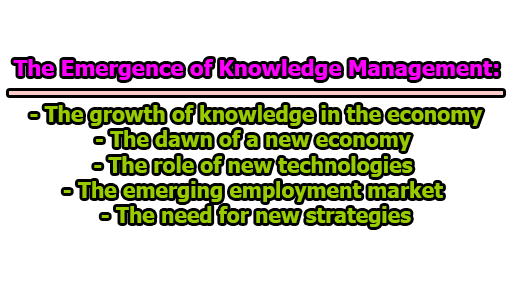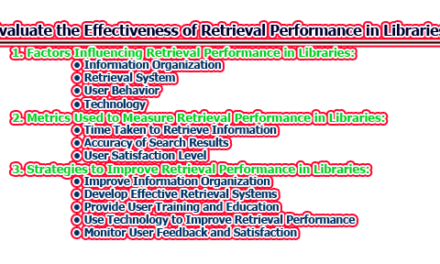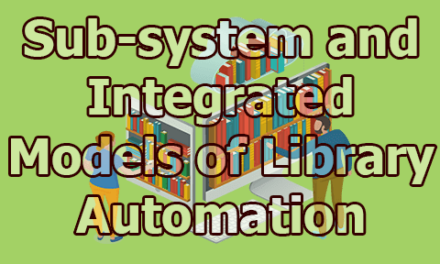The Emergence of Knowledge Management:
The rise of the knowledge economy has been a defining feature of the modern era. With the growth of technology, globalization, and interconnectedness, knowledge has become a key driver of economic growth and development. Knowledge management has emerged as a discipline that seeks to harness this growth and maximize its potential. In this article, we will explore the emergence of knowledge management, with a focus on the growth of knowledge in the economy, the dawn of a new economy, the role of new technologies, the emerging employment market, and the need for new strategies.
The growth of knowledge in the economy has been a significant factor in the emergence of knowledge management. In the past, the economy was primarily based on physical resources such as land, labor, and capital. However, in the knowledge economy, knowledge is the key resource. Knowledge is no longer just a by-product of economic activity; it is now a vital input in the production process. The knowledge economy is characterized by the increasing importance of information, communication, and intellectual assets. In this context, knowledge management has become an essential tool for organizations to remain competitive. To be more precise:
- Increased reliance on knowledge and innovation in the creation of products and services.
- Growth of knowledge industries- knowledge itself is the products/services.
- Development of knowledge-intensive industries – high level of knowledge embedded in products/services.
The dawn of a new economy has also contributed to the emergence of knowledge management. The new economy is characterized by a shift from a manufacturing-based economy to a knowledge-based economy. This shift has been driven by advances in technology, globalization, and changes in consumer behavior. In the knowledge-based economy, knowledge is the primary source of value creation, and knowledge management is essential for organizations to leverage this resource. To be more exact:
- Knowledge has become a key strategic resource.
- A transition from an economy based on materials/ goods to one based on knowledge.
- A knowledge-based economy is one in which the production, distribution, and use of knowledge are the main drivers of growth, wealth creation, and employment for all industries.
The role of new technologies has been another critical factor in the emergence of knowledge management. The internet, social media, and other digital technologies have transformed the way we create, store, and share knowledge. These technologies have made it easier to access and share knowledge, creating new opportunities for collaboration and innovation. Knowledge management has become increasingly important in this context, as organizations need to manage the vast amounts of data and information generated by these technologies. To be more summarize:
- Changing nature of the information and/or knowledge industries.
- The technological forces of the 1980s and 1990s have accelerated the dynamics and growth of the knowledge economy and the management of human knowledge.
The emerging employment market has also contributed to the emergence of knowledge management. In the knowledge economy, the demand for highly skilled workers is increasing, and organizations need to attract and retain these workers to remain competitive. Knowledge management has become an essential tool for organizations to manage their human resources effectively. It enables them to create a culture of continuous learning and development, which is essential for attracting and retaining the best talent. To be more concise:
- New job markets emerged from the knowledge economy.
- Competition arises and many new positions are in the industry sectors.
Finally, the need for new strategies has also driven the emergence of knowledge management. In the knowledge economy, traditional management strategies are no longer sufficient. Organizations need to adopt new strategies that focus on creating, sharing, and applying knowledge. Knowledge management provides a framework for developing these new strategies, enabling organizations to leverage their knowledge assets to achieve their goals. To be more precise:
- The knowledge economy has created unique challenges for organizations, information institutions, managers, and workers.
- New skills and competencies for knowledge workers.
- New techniques and strategies for managing human knowledge.
In conclusion, the emergence of knowledge management has been driven by a range of factors, including the growth of knowledge in the economy, the dawn of a new economy, the role of new technologies, the emerging employment market, and the need for new strategies. Knowledge management has become an essential tool for organizations to remain competitive in the knowledge economy, and its importance is likely to continue to grow in the future.
References:
- Alavi, M., & Leidner, D. E. (2001). Knowledge management and knowledge management systems: Conceptual foundations and research issues. MIS Quarterly, 25(1), 107-136.
- Davenport, T. H., & Prusak, L. (1998). Working knowledge: How organizations manage what they know. Harvard Business Press.
- Earl, M. J. (2001). Knowledge management strategies: Toward a taxonomy. Journal of Management Information Systems, 18(1), 215-233.
- Grant, R. M. (1996). Toward a knowledge‐based theory of the firm. Strategic Management Journal, 17(S2), 109-122.
- Hansen, M. T., Nohria, N., & Tierney, T. (1999). What’s your strategy for managing knowledge?. Harvard Business Review, 77(2), 106-116.
- Nonaka, I., & Takeuchi, H. (1995). The knowledge-creating company: How Japanese companies create the dynamics of innovation. Oxford University Press.
- Polanyi, M. (1966). The tacit dimension. Routledge & Kegan Paul.
- Quinn, J. B., Anderson, P., & Finkelstein, S. (1996). Managing professional intellect: Making the most of the best. Harvard Business Review, 74(2), 71-80.
- Sanchez, R., & Heene, A. (1997). Reinventing strategic management: New theory and practice for competence-based competition. Wiley.
- Zack, M. H. (1999). Managing codified knowledge. Sloan Management Review, 40(4), 45-58.

Library Lecturer at Nurul Amin Degree College










